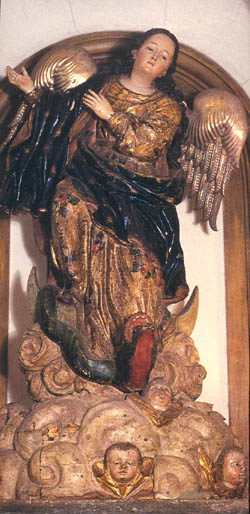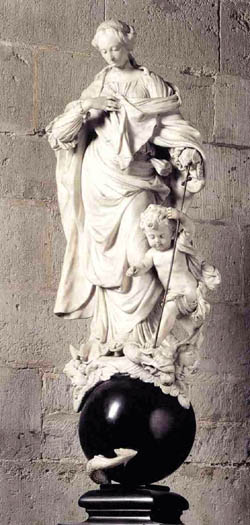 |
Feast Days of Our Lady
The Immaculate Conception of Our Lady
December 8
Prof. Plinio Corrêa de Oliveira
Our Lady was conceived without original sin. She had a perfect purity, with no bad inclinations. Therefore, she had a great facility to correspond entirely with the grace of God at every moment. Natural and the supernatural grandeur merged together in her soul in a profound and extraordinary harmony. Above all others creatures, she had the highest notion of the sanctity of God and His correspondent glory. She also had the clear notion of what Creation owes to that glory. She knew, and knows, how all created beings should glorify God.

Our Lady by her Immaculate Conception crushes the head of the serpent & of all heresies

|
As a consequence, she also had a profound horror of the opposite of good, which is evil. She had a great intransigence to such evil, a complete rejection of it in its least forms and a strong combativeness against it. This is the reason Holy Scripture refers to Our Lady as “terribilis ut castrorum acies ordinata,” as terrible as an army set in battle array. The Church also says that it is she alone who smashes all heresies. To celebrate this fact, in statues of the Immaculate Conception, Our Lady is crushing the head of the serpent.
The feast of her Immaculate Conception is, then, in many senses, the commemoration of her purity, her intransigence, and her combativeness.
Let us look more closely at what intransigence is. When a person has a very clear notion of what is good and an understanding of the highest expressions of this good, this person knows that the opposite is bad. It is not a theoretical knowledge, like that of a scientist who analyzes a specimen in a laboratory, but rather a knowledge that comes hand in hand with a great love for good. The person naturally recognizes the opposite of such good, which is evil, and hates evil with an intensity proportionate to the magnitude of his love for the good.
Since he loves the highest ideals that good represents, he cannot tolerate the opposite of that good, because he clearly sees the evil that exists in it. He rejects evil not only in its ensemble, but in each of its parts. He rejects evil not only when it is very intense, but when it barely appears. This is intolerance or intransigence.
The human spirit is constituted in such a way that when a man hates evil, he increases and perfects his love for the good. In a certain way the presence of something that he rejects reinforces his conviction of, and his love for the good. The human psychology is so established that such contrast makes a person more acutely aware of how the good is good. For instance, we love our counter-revolutionary vocation more when we can see concretely how the revolutionaries hate it. Seeing this, we receive a confirmation that we are taking the right position.
What is combativeness? Combativeness is a consequence of intransigence. It is to make a deliberate decision to destroy the evil that opposes the glory of God. It is a calm deliberation followed by the utilization of every means one has at his disposal to achieve that goal. It is not a fleeting resolution to fight during one single episode when evil is attacking good, but it is a permanent determination applied to all aspects of evil and throughout the life of a person. The person does not rest until evil is destroyed.
A true combativeness does not rest until evil is reduced to ashes. In Portugal there was an expression regarding evil that was applied in different ways in old Portuguese Law: Evil shall be reduced to ashes by fire. If a man committed a horrific crime, he received the sentence of capital punishment: his body was burned, and his ashes dispersed either in the air or water. This was the application of that axiom.
Here I am not advocating this punishment be applied to this or that person in this or that present day State. I am taking it as a general principle to apply to the fight of ideas and institutions. A bad man can be killed, and he is gone. But who can kill a bad idea or destroy a revolutionary conspiracy that strives to prevent God from receiving the glory He deserves and Holy Mother Church from carrying out her mission on earth? For this fight we need a true combativeness that reduces the Revolution and its cohorts to ashes by fire. This kind of intransigence and combativeness were two attributes of Our Lady that were consequences of the privilege of her Immaculate Conception.
What should we ask Our Lady on this feast day? We should ask for a great love of God and a high understanding of His glory, which will, as a natural consequence, give us a great intransigence and combativeness.
I remember that St. Therese of Lisieux used to lament that she could not be a warrior and fight with a sword against the enemies of God. This is the soul of a saint. She desired to fight for God in all places and all times. This is how we should be. Let us ask Our Lady for the purity and combativeness proper to sanctity so that we might be her true sons and daughters.


Watch a video illustration of this Saint of the Day article
here

  | | Prof. Plinio Corrêa de Oliveira | |
The Saint of the Day features highlights from the lives of saints based on comments made by the late Prof. Plinio Corrêa de Oliveira. Following the example of St. John Bosco who used to make similar talks for the boys of his College, each evening it was Prof. Plinio’s custom to make a short commentary on the lives of the next day’s saint in a meeting for youth in order to encourage them in the practice of virtue and love for the Catholic Church. TIA thought that its readers could profit from these valuable commentaries.
The texts of both the biographical data and the comments come from personal notes taken by Atila S. Guimarães from 1964 to 1995. Given the fact that the source is a personal notebook, it is possible that at times the biographic notes transcribed here will not rigorously follow the original text read by Prof. Plinio. The commentaries have also been adapted and translated for TIA’s site.
|
Saint of the Day | Home | Books | CDs | Search | Contact Us | Donate

© 2002- Tradition in Action, Inc. All Rights Reserved
|
 |

|